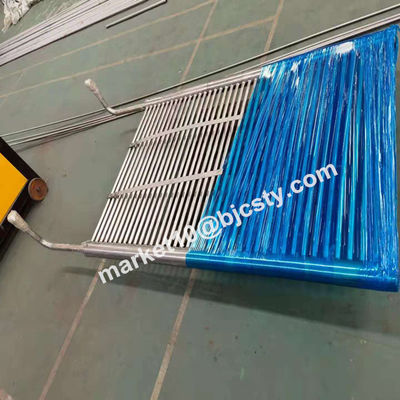-
Titanium Pipe Fittings
-
Titanium Welded Pipe
-
Titanium Pipe Flange
-
Seamless Titanium Tubing
-
Titanium Heat Exchanger
-
Titanium Coil Tubing
-
Titanium Alloy Sheet
-
Titanium Fasteners
-
Titanium Welding Wire
-
Titanium Round Bar
-
Titanium Forgings
-
Titanium Clad Copper
-
Titanium Electrode
-
Metal Sputtering Target
-
Zirconium Products
-
Sintered Porous Filter
-
Shape Memory Nitinol Wire
-
Niobium Products
-
Tungsten Products
-
Molybdenum Products
-
Tantalum Products
-
Equipment Products
-
Aluminum Products
-
Stainless Steel Products
High Temperature Resistance Titanium Coil Heat Exchanger for Oil and Gas Industry
| Place of Origin | CHINA |
|---|---|
| Brand Name | CSTY |
| Certification | ISO9001:2015 |
| Minimum Order Quantity | 10kgs |
| Price | $110.00 - $150.00/ Piece |
| Packaging Details | film and wooden case,carton Packaging can be according to customer requirements. |
| Delivery Time | 15~20 work days |
| Payment Terms | L/C, T/T, Western Union, MoneyGram,Paypal |
| Supply Ability | 5000 Kilogram/Kilograms per Month |

Contact me for free samples and coupons.
Whatsapp:0086 18588475571
Wechat: 0086 18588475571
Skype: sales10@aixton.com
If you have any concern, we provide 24-hour online help.
x| Coils Surface | Acid Washing Surface | Application | Oil And Gas Industry |
|---|---|---|---|
| Chemical Composition | Ti, Al, V, Fe, O, C, N | Surface Treatment | Polished |
| Sample | Bespoke Samples As Client's Request | Dimension | Custom Size |
| Temperature Resistance | High | Length | Customized |
| Keyword | Titanium Coil Tubing | Coil Diameter | 9.52mm To 80mm |
| Corrosion Resistance | Excellent | Tube Diameter | 8mm To 114mm |
| Diameter | 9.52mm To 80mm | Product | Welded Titanium Spiral Tube |
| Titanium Tube Size | OD9.52/12.7/16/19.05/25.4/38.1mm,etc. | ||
| Highlight | Titanium Coil Heat Exchanger,High Temperature Resistance Titanium Coil |
||
Description
Titanium tube coils are commonly used in heat exchangers that require superior corrosion resistance and excellent thermal conductivity. The coil is typically made from a long, continuous titanium tube wound into a spiral or helical shape.
Manufactured in accordance with ASTM B338 / ASME SB-338, titanium tube coils are widely used in the fabrication of tubular heat exchangers. Tubular heat exchangers—also known as shell and tube heat exchangers—include double-pipe, shell-and-tube, and coiled-tube types. Among these, coiled tube heat exchangers are the most widely used in petrochemical production due to their compact structure and efficient heat transfer performance.
Specification
| Item | Description |
|---|---|
| Product Name | Titanium Tube Coil |
| Material Grades | TA1 (Gr1, BT1-00), TA2 (Gr2, BT1-0), TA9 (Gr7), TA10 (Gr12) |
| Coil Diameter | Outer Diameter (OD): φ200 – 3000 mm |
| Tube Size | OD 9.52×0.6 / 12.7×0.9 / 16×0.9 / 19.7×1 / 25×2 mm (seamless or welded) |
| Other Components | Channels (heads), tube sheets, baffles, tie rods & spacers, pass partition plates, expansion joint (when required) |
| MOQ | 1 set |
| Working Conditions | Refrigerant side (in tube): R22, R134a, R407C, R410A, etc. Water side (in tank): Natural water, drinking water, seawater, etc. |
| Applications | Chemical industry, petroleum, metallurgy, power generation, seawater desalination, and more |
Main Components
-
Titanium Tubing
The primary component of the coil, made from high-quality titanium to ensure superior corrosion resistance, high strength, and thermal conductivity. -
Header
Directs the flow of fluids into and out of the coil. Typically made from stainless steel or titanium for high pressure and corrosion resistance. -
Tube Sheet
A metal plate that supports and seals the tubes to the header. Made from stainless steel or titanium for durability and chemical resistance. -
Baffles
Metal plates are positioned to guide fluid flow and enhance heat transfer efficiency. -
Support Structure
Holds the coil securely in place and prevents vibration during operation. Constructed from durable materials such as steel or aluminium. -
Fittings and Connections
Used to connect the coil with the header and other components of the heat exchanger. Usually made from corrosion-resistant stainless steel or titanium.
Features & Benefits
Excellent corrosion resistance in seawater and chemical environments
High thermal conductivity for superior heat transfer
Lightweight yet high-strength structure
Long service life and low maintenance cost
Suitable for a wide range of working fluids and pressures
Applications
Titanium tube coils are widely used in:
Chemical and petrochemical processing
Power generation and condensers
Seawater desalination and marine systems
Chlor-alkali and salt production plants
Metallurgical processes
Food and pharmaceutical industries
Aerospace and medical heat transfer systems
They are also applied in the production of titanium powder, glycine, pesticides, fuel additives, and various chemical intermediates such as cyanuric acid, diaminocyanuric acid, and tricyanuric acid.












